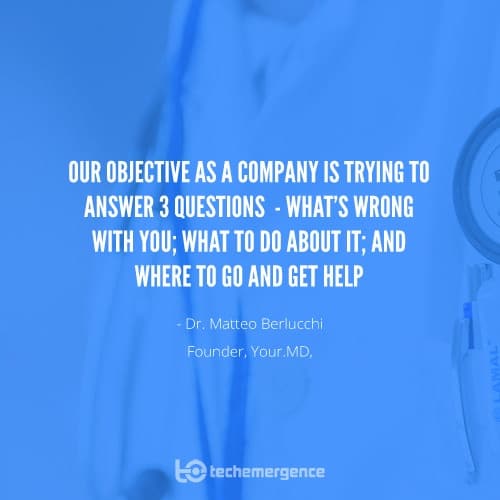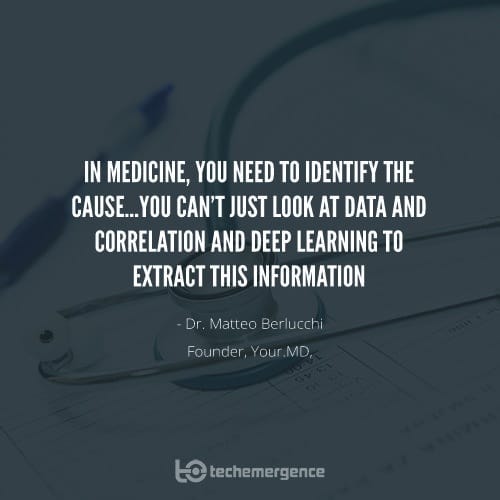
Episode Summary: In this episode, we speak with Dr. Matteo Berlucchi, the founder of Your.MD, which uses artificial intelligence to create one of the first personal health assistant platforms in 70+ countries. Berlucchi talks about the challenges in making an AI do what you want, specifically helping people self diagnose and seek proper treatment. He discusses the multiple approaches to AI that are blended together in order to yield optimal results, and touches on the sometimes stark differences between what AI can do in the lab versus the functional application for tens of thousands of people. If you’re interested in the diverse applications of AI and the challenges in running a startup, Dr. Berlucchi’s makes for an interesting episode.
Expertise: Digital entrepreneurship, media and marketing
Recognition in Brief: Since 1995, Matteo Berlucchi, Ph.D., has founded and run several start-ups across the major verticals of the digital spectrum. He is an angel investor, mentor and board director, and a consistent proponent of the growth of digital in all aspects of daily life. Berlucchi is an expert in many aspects of small-to-large scale digital businesses, including the areas of: digital health; media; publishing; eBooks; eCommerce; retail; online marketing; digital strategy; consumer engagement and analytics; start-ups; fund raising; go-to-market; and team building. Berlucchi has a doctoral degree in physics from Università degli Studi di Padova and did postgrad research in virtual reality at Imperial College London.
Current Affiliations: CEO at Your.MD; Chairman & Co-Founder of Vini Italiani; Mentor with Seedcamp; Founder and Non-Executive Director of Livestation; Advisor with Firestartr

Interview Highlights:
(1:30) How much information was needed to sort of preload your systems in order to respond to people intelligently?
“We believe once we can do this we fundamentally remove the need to see a doctor for all those cases that required minor ailments or self care…in the UK the estimate is 3 in 5 visits to a general practitioner are things you can do on your own if you have information and advice.” – Dr. Matteo Berlucchi
(10:04) If you have a machine and you give it the last 10 years of stock price information…or whatever the case, in real-time…if you’re seeking correlation…you’ll find that, and you may be able to use that to functionally make a higher yield in the stock market, even if you d on’t understand the why or the what, there is a correlation…it sound like in this case with knowledge, if you go on correlation, you could be running into danger, so in this particular case we don’t just need a correlation, we need to be able to tie things to what is logical and rational in terms of yield…
(15:40) In order to make AI work, what are the challenges you’ve run into that maybe you would have never known about if you’d never started a company, what have you learned in this process?
“As a physicist, I have a way of thinking about things which is helpful when trying to solve new problems. What I discovered…is that technology is never capable of doing things on its own. Technology should always be assisting humans, I’m a strong believe of this symbiotic relationship of the human and the machine.” – Dr. Matteo Berlucchi
(19:09) It sounds like, being able to see in the backend, you realize maybe how much this (AI infrastructure) doesn’t happen unless someone tangibly orchestrates all the pieces…

[This article has been updated as of December 2016.]











